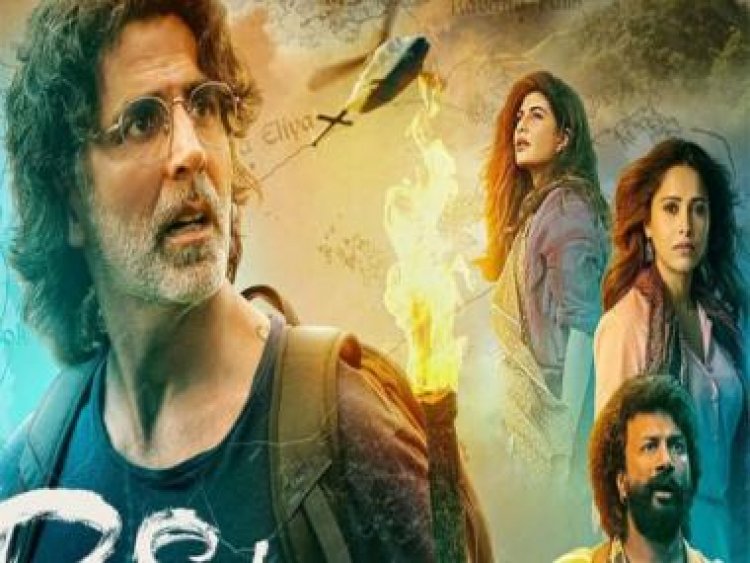How faith trumps science in ‘Ram Setu’, Bollywood’s latest attempt to create ‘nation-building cinema’
How faith trumps science in ‘Ram Setu’, Bollywood’s latest attempt to create ‘nation-building cinema’

The last few weeks have been confusing for those who get their cues on social norms from popular culture. Some notables have criticised the request from Delhi Chief Minister Arvind Kejriwal that Lakshmi and Ganesha should find a place on the country’s currency notes, because the “country will progress only with a confluence of correct policy, hard work and blessings of the gods’”.
The same people have welcomed the change of heart that an atheist archaeologist has in the Bollywood film, Ram Setu, which is part adventure movie and part mythological. Without giving too much away, it can be said that the Bamiyan Buddha-loving archaeologist played by Akshay Kumar who gets lectures from his wife, a professor of literature, on not scoffing at the faith of the devout, has a change of heart towards the end because of a divine intervention.
In a country where myth and history have always been closely linked, the mixing of the secular and sacred is confusing to those who believe in the Constitution. And nowhere is the secular and sacred mixing with as much frequency and abandon as in the Mumbai film industry which seems to have taken to heart the government’s diktat of making “nation-building cinema”.
In film after film, Bollywoodians say they are making history and when they are attacked for it, from the left or right, they take cover in myth, folklore and poetry, instead of standing their ground. So, Padmaavat was based on a poem written by Malik Mohammad Jayasi in 1540 CE and not history according to textbooks. Or so Sanjay Leela Bhansali told us after the Kranti Sena went after him for suggesting that Alaudin Khilji, who ruled Delhi between 1296 and 1316, lusted after the pure Padmini. Equally, Chandra Prakash Dwivedi, the creative consultant for Abhishek Sharma’s Ram Setu, declared that his film, Samrat Prithviraj, was based on Prithviraj Raso written by the king’s court poet Chand Bardoi. And that if we accepted Akbarnama written by Amir Khusrau, the Mughal ruler’s court poet, we should have no trouble accepting Bardoi’s version of events.
Fair enough. We have lived through an era when the Ramayana and the Mahabharata were watched in homes in the late ’80s with agarbatti and prasad. Ramanand Sagar, the creator of the Ramayana, said on record to his son that the version of the epic he wrote was dictated to him by his idol of Lord Hanuman. As a country we have no problem believing in acts of God and holy miracles. Or that our epics are itihasa, things that happened. We also know that while Valmiki and Ved Vyas wrote the two great epics based on fact, they also added a lot of fantastical elements to it. As scholar Nanditha Krishna has pointed out: After all, Valmiki’s work had to be readable.
But the movie theatre was still a public space where the sacred and the secular rarely mixed in post-Independence India. Sure, in the year Sholay was released, 1975, there was another blockbuster, Jai Santoshi Maa, made for Rs 25 lakh and grossing Rs 5 crore, on the till then little known Goddess. Meera (1979), directed by Gulzar with music by Pandit Ravi Shankar, is a brilliant example of a film on faith that traverses issues of gender quality, liberty and the power of spirituality. But as Shivram Washikar, who wrote Sant Tukaram (1936) — the devotional genre flourished at the height of the nationalist movement in the 1930s and ’40s-says the writer has to be in between the believer and the researcher. He or she cannot be both.
In Ram Setu, our archaeologist hero starts as a researcher (that too with fellow men of science from Afghanistan and Pakistan) and ends up a believer. His God-fearing wife and their Amar Chitra Katha-reading child are now safe, whereas earlier the former would worry that her husband wanted them to be thrown out of the country by questioning the historicity of Lord Ram. There are also those who are delighted with the reality of an avowedly Hindu prime minister in power in England, forgetting that his governance will be determined by his nationality though his idea of duty may be propelled by his faith.
Indeed, the two most devout politicians India has produced, Mahatma Gandhi and Zakir Husain, were secularists to the core. And committed atheists, Mohammad Ali Jinnah and Veer Savarkar ended up committing acts that divided people on religion. in a country, where there is no consensus even on history, surely there can be none on religion? And that indeed is the beauty of the Hindu civilisation, which does not believe in any one book, doesn’t have any one God, and certainly doesn’t advise any one way of worship. This is a country where there are many Ramayanas and each is celebrated by those who believe in it.’
Those who argue for the “correct” depiction of Hinduism and Hindus by the so-called Islam-influenced Bollywood will always come up against this splendid diversity. And those who do not allow science alone to establish the actuality of our epics will do it a great disservice.
The author is a senior journalist and former editor of India Today magazine. The views expressed in this article are those of the author and do not represent the stand of this publication.
Read all the Latest News, Trending News, Cricket News, Bollywood News,
India News and Entertainment News here. Follow us on Facebook, Twitter and Instagram.
What's Your Reaction?



























































